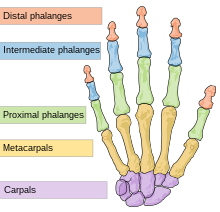phalanx
See also: Phalanx
English

Etymology
Borrowed from Latin phalanx or Ancient Greek φάλαγξ (phálanx, “battle order, array”). Doublet of plank.
Pronunciation
Noun
phalanx (plural phalanxes or phalanges)
- (historical, plural phalanxes) An ancient Greek and Macedonian military unit that consisted of several ranks and files (lines) of soldiers in close array with joined shields and long spears.
- (historical sociology) A Fourierite utopian community; a phalanstery.
- (plural phalanxes) A large group of people, animals or things, compact or closely massed, or tightly knit and united in common purpose.
- (anatomy, plural phalanges) One of the bones of the finger or toe.
Synonyms
- (anatomy, bone of the finger or toe): phalange
Hyponyms
- (bone of the finger): distal phalanx, intermediate phalanx, proximal phalanx
Translations
ancient Greek military unit
|
finger or toe bone
|
large group of animals, plants, or people
|
large group of people
Latin
Alternative forms
- falanx (later form)
Etymology
From Ancient Greek φάλαγξ (phálanx). Compare Latin phalanga.
Pronunciation
- (Classical Latin) IPA(key): /ˈpʰa.lanks/, [ˈpʰäɫ̪äŋks̠]
- (modern Italianate Ecclesiastical) IPA(key): /ˈfa.lanks/, [ˈfäːläŋks]
Noun
phalanx f (genitive phalangis); third declension
Declension
Third-declension noun.
| Case | Singular | Plural |
|---|---|---|
| Nominative | phalanx | phalangēs |
| Genitive | phalangis | phalangum |
| Dative | phalangī | phalangibus |
| Accusative | phalangem | phalangēs |
| Ablative | phalange | phalangibus |
| Vocative | phalanx | phalangēs |
Related terms
Descendants
References
- “phalanx”, in Charlton T. Lewis and Charles Short (1879) A Latin Dictionary, Oxford: Clarendon Press
- “phalanx”, in Charlton T. Lewis (1891) An Elementary Latin Dictionary, New York: Harper & Brothers
- phalanx in Gaffiot, Félix (1934) Dictionnaire illustré latin-français, Hachette.
- Carl Meißner, Henry William Auden (1894) Latin Phrase-Book[1], London: Macmillan and Co.
- to form a phalanx: phalangem facere (B. G. 1. 24)
- to break through the phalanx: phalangem perfringere
- to form a phalanx: phalangem facere (B. G. 1. 24)
- “phalanx”, in Harry Thurston Peck, editor (1898), Harper's Dictionary of Classical Antiquities, New York: Harper & Brothers
- “phalanx”, in William Smith et al., editor (1890), A Dictionary of Greek and Roman Antiquities, London: William Wayte. G. E. Marindin
Categories:
- English terms borrowed from Latin
- English terms derived from Latin
- English terms borrowed from Ancient Greek
- English terms derived from Ancient Greek
- English doublets
- English 2-syllable words
- English terms with IPA pronunciation
- English terms with audio links
- English lemmas
- English nouns
- English countable nouns
- English nouns with irregular plurals
- English terms with historical senses
- en:Skeleton
- en:Ancient Greece
- en:Collectives
- Latin terms derived from Ancient Greek
- Latin 2-syllable words
- Latin terms with IPA pronunciation
- Latin lemmas
- Latin nouns
- Latin third declension nouns
- Latin feminine nouns in the third declension
- Latin feminine nouns
- Latin words in Meissner and Auden's phrasebook
